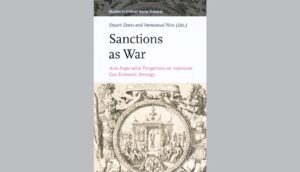 The economic contraction produced by sanctions generates famine, disease, unemployment, poverty, and foment civil strife. In this way, as an aspect of war, they resemble mediaeval sieges that starved out cities to compel surrender, writes Farooque Chowdhury
The economic contraction produced by sanctions generates famine, disease, unemployment, poverty, and foment civil strife. In this way, as an aspect of war, they resemble mediaeval sieges that starved out cities to compel surrender, writes Farooque Chowdhury
SANCTION is an old weapon. Warring parties have used the weapon for ages. Today, the lords of the world, the US, almost rampantly use this weapon to further their geopolitical strategy.
‘The US’, write editors Stuart Davis and Immanuel Ness in Sanctions as War: Anti-Imperialist Perspectives on American Geo-Economic Strategy, ‘has depended increasingly on economic, political and cultural hegemony as partial substitutes for military power through the application of economic sanctions.’ Stuart and Immanuel elaborate on US-imposed sanctions: ‘These sanctions generally work to punish states that did not conform to its will or pose a potential competitive threat on a regional or global basis. Furthermore, these sanctions have often been levelled at states that challenged global neoliberalism, the world economic system imposed by the US and its Western European partners.’ They mention, ‘Economic sanctions are increasingly extended to include entire populations of nations. The US has augmented sanctions by banning all third parties from engaging in economic activities with designated countries. As a result, economic sanctions in effect punish entire populations of nation-states.’ Stuart and Immanuel explain, in short, the US-tact with sanctions: ‘The US and its allies have applied economic sanctions as a means to foment dissent in hopes of destabilising leaders and governing parties (often referred to in the parlance as ‘regimes’) and often to overthrow and oust them from power and [empower] political leaders who are supportive of US policies. Often, the US and its allies support NGOs as well as form oppositional organisations and political fronts to confront governments it opposes. If countries are enduring major recessions and economic collapse, these groups are instrumental in selecting opposition leaders and parties. This is a reason why economic sanctions are a vital aspect of imperialism and inter-imperialist rivalries.’ This fact of sanction is evident in Cuba, Venezuela, Iran, and other countries.
The book ‘examines the cause and effects of sanctions.’ It explores ‘the use of economic sanctions by the US as an integral part of the growing inter-imperialist rivalry, the NGOs and imperialist government organisations that sustain sanctions, the legitimation of sanctions through the media, and the devastating effects of economic sanctions.’ Cuba, Venezuela and Iran are examples of economic sanctions’ devastating effects. Ultimately, people in these lands are now bearing the devastating effects of sanctions. It should be mentioned that during the last pandemic, Cuba was waging a successful fight against the dreaded pandemic. The geographically small island country was extending, in solidarity with people in other countries, including advanced bourgeois economies in Europe, assistance in the fight against the pandemic. These assistances included physicians and medical aid. The revolutionary country was among the first to find out and produce effective vaccines to fight out the novel Corona virus. Those vaccines, in huge quantity, were handed over to other countries. At that time, such vaccines were urgently needed by millions of human beings. But imperialism had another logic, absurd in human view, and that was, in functional terms, sanctions. This draconian sanction impeded Cuba’s efforts to import medical supplies required for producing the vaccines. Even Cuba’s importing of very primary medical products like gloves, face masks, Covid-19 diagnostic kits, and ventilators was obstructed. Sanctions were so scary that air cargo companies denied carrying medical supplies to Cuba despite assuring the companies that the supplies were beyond sanctions. The companies feared they could face punitive measures for violating some article of the sanctions unknown to them. The blockade prevented Cuba from purchasing medicines from US firms. US sanctions took a heavy toll on Cuba, while Cuba always stands by distressed people in other countries. The Cuban Health Ministry lost $160 million between April 2019 and March 2020 due to the sanctions, $60 million more than the year prior. Due to sanctions, Venezuela is pressed to a failure, and that is with producing oil. The country with a huge hydrocarbon reserve faces failure to produce oil. This failure is caused by the success of years of imperialist sanctions imposed on the Latin American country.
At one end of using this powerful weapon — sanctions — are the people in sanctioned countries that pay the price, which is not small but devastating. The devastating effect is borne not only by a single country but by a wider human community — people in countries. Davis and Immanuel ‘consider sanctions as harming entire nations, not just those purportedly harboring weapons of mass destruction or violating human rights. Ordinary citizens, especially the working class and those most vulnerable to economic deprivation, inevitably bear the weight of the damage. Sanctions create a scarcity of essential goods and services, like food, oil, medicine, and spare parts for power stations which provide electricity. By preventing trade, national currencies lose their value, leading to hyperinflation, which fuels speculation, hoarding, and protracted shortages of essential goods and services. The economic contraction produced by sanctions generates famine, disease, unemployment, poverty, and foment civil strife. In this way, as an aspect of war, they resemble mediaeval sieges that starved out cities to compel surrender.’ Stuart and Immanuel mention the hard truth: sanctions ‘resemble medieval sieges that starved out cities to compel surrender’. The economic and political interests of imperialism are so cruel!
In Sanctions as War Anti-Imperialist Perspectives on American Geo-Economic Strategy, first published in 2021 by Brill Academic Publishers, Leiden, Stuart and Immanuel inform: As of January 1, 2020, the US Treasury Department’s Office of Foreign Asset Control has unilaterally imposed sanctions on the following countries: Belarus, Burundi, Central African Republic, Cuba, the Democratic Republic of the Congo, Iran, Iraq, Lebanon, Libya, Mali, Nicaragua, North Korea, Russia, Somalia, Serbia, Sudan, South Sudan, Syria, Venezuela, Yemen, and Zimbabwe. To imperialism, these countries are ‘criminals’ and ‘rouge states’. But an objective analysis of the states mentioned above will find the empire has either clash of interests, or, geostrategic, or geotactical competition, or there’s the empire’s long-term plan to subjugate the country in order to exploit the country’s either natural or strategic resources, labour, or geopolitical, geostrategic, or geotactical location. In addition, a number of these countries, including Cuba, stand as examples of alternative approaches to life, to the political and governing systems, and to the dignity and honour of a people that obviously stand on a higher plane than the exploitative and imperialist systems. It’s expected that Stuart and Immanuel will add some more countries to the above list in the book’s next edition, as the empire is resorting to imposing more sanctions the more it finds itself in an atmosphere increasingly charged with forces hostile to the imperialist world order. The imperialist system’s sanctions are turning into a weapon enveloping all, as it’s been found in the case of sanctions imposed against Russia. The sanctions imposed on Russia spare none other than pet animals. The sanctions include clients of the capitalist banking system and partners in trade and commerce within the imperialist world order.
The editors write: ‘While not exhaustive, this list of countries includes the poorest countries of the world, which are unable to sustain the loss of trade and essential food and medicines. In many cases, sanctions also hinder the possibility of economic resuscitation, as the US imposes sanctions on third-party states that engage in trade with countries on the Treasury Department list. Concomitantly, the vast majority of countries which are targeted by the US and its allies by sanctions are endowed with petroleum and strategic minerals and natural resources for new technology and military uses.’ Here are a few hard facts about sanctions imposed by imperialism: ‘poorest countries […] unable to sustain the loss of trade and essential food and medicines’, ‘sanctions […] hinder the possibility of economic resuscitation’. Imperialism’s brutal face is exposed, although, today, in the Global South, there are some friends of imperialism who shamelessly identify imperialism as ‘friend, philosopher, guide and patron of democracy worldwide’.
The social scientists add: ‘All in all, economic sanctions are a weapon wielded by the most powerful, the US and its allies in Western Europe and beyond, against the poor and weak in the poorest countries of the Global South.’ This fact is impossible to ignore today. But, a few shameless souls, Guaidos in countries, befriend imperialism! To these unashamed guys, there’s nothing like the interests of the poor and the poorest; to these gentlemen, there’s nothing like anti-imperialism. To these lieutenants of imperialists, imperialist interests ‘should’ prevail everywhere.
In the ‘Introduction’, Stuart and Immanuel cover issues like:
Demystifying the role of sanctions within international governance: Moving beyond orthodox international relations theory.
Conceptual trend 1: Sanctions’ regimes as geo-economic games within a traditional international relations approach.
Conceptual trend 2: Opposition to sanctions on humanitarian grounds and the problem of criticism without structural critique.
US sanctions and American imperialism: Overlapping economic and geopolitical concerns in the waning American century.
The near-400-page book has three parts:
Part 1: Theorising and Situating Economic Sanctions in International Political Economy.
Part 2: Profiles of Sanctioned Nation-States.
Part 3: Resistance to Economic Sanctions and Economic Sanctions as Resistance.
The book’s contributors include Dr Shireen Al-Adeimi, assistant professor of language and literacy at Michigan State University’s College of Education; Tim Beal, a retired New Zealand academic who has written extensively on Asia, particularly Northeast Asia and US imperialism; Renate Bridenthal, Emerita Professor of History, Brooklyn College, The City University of New York; Jesse Bucher, Associate Professor of History and Director of the Center for Studying Structures of Race at Roanoke College; and Gregory Elich, a Korea Policy Institute associate and a board member of the Jasenovac Research Institute.
The imperialist weapon of sanction raises fundamental questions: ‘Who shall use resources for what purpose with what motive, and who is to be served — people or profiteers?’
The bosses shall never attend to the questions. They’ll shy away from the questions, as they’re dignified gentlemen, and get busy selling their ideas for loot. Then, people have to attend to the question: whether life or death, whether a humane world where life thrives or a world where negligence to issues critical for life and love for greed’ stands arrogantly?
The book from Haymarket Books is essential for studies on sanctions, today’s geopolitics and imperialism.









